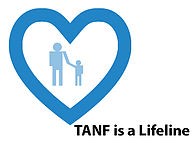The District’s rigid Temporary Assistance for Needy Families (TANF) time limit prevents hard-working DC residents who have faced obstacle after obstacle on their journey towards economic stability — such as Adissa Peters — from receiving a livable income to sustain themselves and their families. A rigid time limit doesn’t take into account the realities of the systematic barriers that make it so hard for low-income District residents to make it out of poverty.
Adissa became pregnant when she was in the 11th grade. Determined to finish high school, she started receiving TANF so she could achieve her goal. This required a hectic schedule of attending school, dropping her son off at daycare and then going to the job-training classes required from her TANF vendor. After Adissa graduated from high school, her mother was diagnosed with brain cancer. Not being able to afford a full-time nurse, Adissa had to forego finding a job to take care of her mother,  which prevented her from being able to receive a full-time job.
which prevented her from being able to receive a full-time job.
While she supported her mother, the $365 a month Adissa received from TANF was essential to having Adissa and her son simply get by.
Adissa dutifully attended the classes from her vendor and had goals of working as a Dental Assistant or in Food Service. Adissa also sought out other social service agencies to help her find employment, sometimes going to the non-profits LIFT-DC and STRIVE to create a resume, conduct mock-interviews and learn proper office etiquette. She also continuously tried to tap into her network to find jobs where she could.
Yet TANF is not providing Adissa and her son the support she needs. She used up 36 months of her 60-month time limit finishing high school and taking care of her mother who had brain cancer. After her mother passed, she found a full-time job but not make enough to live on, and used up her remaining time-limited months of TANF. Now that she has received TANF for more than 60 months, she only qualifies for a potential $122 in TANF benefits, yet she earns too much from her modest job to receive this. Addisa and her son now get no TANF assistance.
This occurred while Adissa was simultaneously struggling with depression and domestic violence which eventually led to the imprisonment of the father of her child. If Adissa’s’ life situation were taken into account and her benefits were extended, she would have the time and baseline stability needed care for herself and her son while to preparing for a career and building her savings towards long-term independence from TANF.
The Department of Human Services has made progress in improving TANF services, such as increased access to case management, but the process is not complete and it is very recent. As Adissa’s example illustrates, many TANF recipients have not gotten the proper support they need to address significant barriers and become financially independent — and yet they still have to suffer the consequences of the time limit.
DC can do so much more to address poverty in our communities, and it starts with extending TANF’s critical services and full benefits to families like Adissa’s. We urge the Council take action this budget season to implement critical time limit extensions. Adissa and so many other families need help now.
To print a copy of today’s blog, click here.
